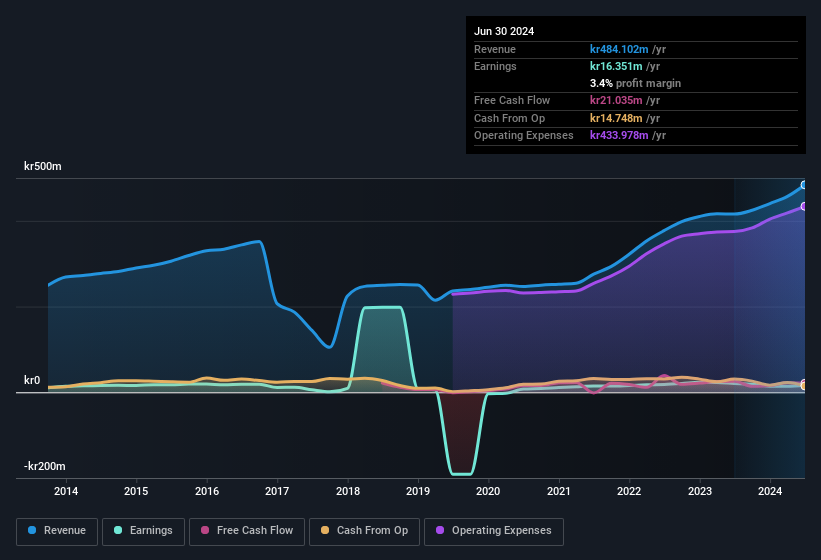- Sweden
- /
- Consumer Services
- /
- NGM:HOME B
There May Be Some Bright Spots In HomeMaid's (NGM:HOME B) Earnings
HomeMaid AB (publ)'s (NGM:HOME B) recent soft profit numbers didn't appear to worry shareholders, as the stock price showed strength. However, we think the company is showing some signs that things are more promising than they seem.
See our latest analysis for HomeMaid

Zooming In On HomeMaid's Earnings
In high finance, the key ratio used to measure how well a company converts reported profits into free cash flow (FCF) is the accrual ratio (from cashflow). In plain english, this ratio subtracts FCF from net profit, and divides that number by the company's average operating assets over that period. You could think of the accrual ratio from cashflow as the 'non-FCF profit ratio'.
Therefore, it's actually considered a good thing when a company has a negative accrual ratio, but a bad thing if its accrual ratio is positive. That is not intended to imply we should worry about a positive accrual ratio, but it's worth noting where the accrual ratio is rather high. To quote a 2014 paper by Lewellen and Resutek, "firms with higher accruals tend to be less profitable in the future".
Over the twelve months to June 2024, HomeMaid recorded an accrual ratio of -0.12. That indicates that its free cash flow was a fair bit more than its statutory profit. In fact, it had free cash flow of kr21m in the last year, which was a lot more than its statutory profit of kr16.4m. HomeMaid's free cash flow actually declined over the last year, which is disappointing, like non-biodegradable balloons.
Note: we always recommend investors check balance sheet strength. Click here to be taken to our balance sheet analysis of HomeMaid.
Our Take On HomeMaid's Profit Performance
HomeMaid's accrual ratio is solid, and indicates strong free cash flow, as we discussed, above. Based on this observation, we consider it likely that HomeMaid's statutory profit actually understates its earnings potential! And on top of that, its earnings per share have grown at 6.4% per year over the last three years. Of course, we've only just scratched the surface when it comes to analysing its earnings; one could also consider margins, forecast growth, and return on investment, among other factors. So while earnings quality is important, it's equally important to consider the risks facing HomeMaid at this point in time. To that end, you should learn about the 3 warning signs we've spotted with HomeMaid (including 1 which is concerning).
Today we've zoomed in on a single data point to better understand the nature of HomeMaid's profit. But there are plenty of other ways to inform your opinion of a company. Some people consider a high return on equity to be a good sign of a quality business. While it might take a little research on your behalf, you may find this free collection of companies boasting high return on equity, or this list of stocks with significant insider holdings to be useful.
Valuation is complex, but we're here to simplify it.
Discover if HomeMaid might be undervalued or overvalued with our detailed analysis, featuring fair value estimates, potential risks, dividends, insider trades, and its financial condition.
Access Free AnalysisHave feedback on this article? Concerned about the content? Get in touch with us directly. Alternatively, email editorial-team (at) simplywallst.com.
This article by Simply Wall St is general in nature. We provide commentary based on historical data and analyst forecasts only using an unbiased methodology and our articles are not intended to be financial advice. It does not constitute a recommendation to buy or sell any stock, and does not take account of your objectives, or your financial situation. We aim to bring you long-term focused analysis driven by fundamental data. Note that our analysis may not factor in the latest price-sensitive company announcements or qualitative material. Simply Wall St has no position in any stocks mentioned.
About NGM:HOME B
Outstanding track record with excellent balance sheet and pays a dividend.
Market Insights
Weekly Picks


Crazy Undervalued 42 Baggers Silver Play (Active & Running Mine)


Fiducian: Compliance Clouds or Value Opportunity?

Willamette Valley Vineyards (WVVI): Not-So-Great Value
Recently Updated Narratives

Significantly undervalued gold explorer in Timmins, finally getting traction

Moderation and Stabilisation: HOLD: Fair Price based on a 4-year Cycle is $12.08


Positioned globally, partnered locally
Popular Narratives


MicroVision will explode future revenue by 380.37% with a vision towards success


NVDA: Expanding AI Demand Will Drive Major Data Center Investments Through 2026





